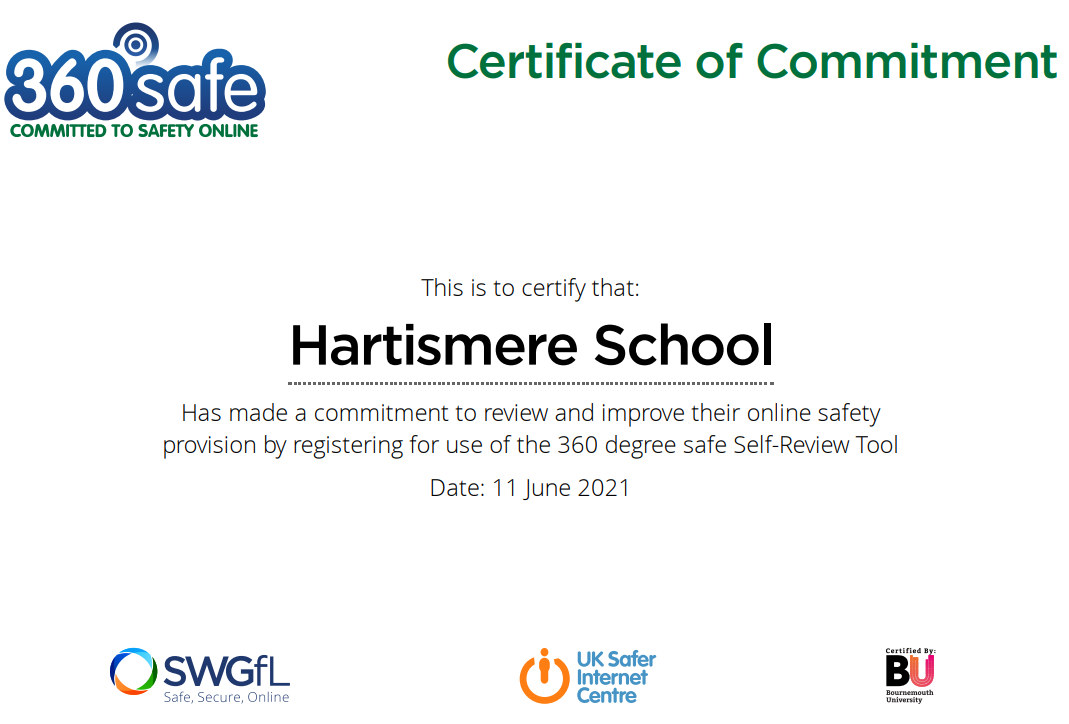
E-Safety

We are thoroughly committed to improving student’s e-safety awareness at Hartismere.
Our Technology Acceptable Use policy is signed up to by all students.
If a student, parent/carer, or member of staff has a concern relating to online safety, they can report it directly to the safeguarding team.
We seek to embed e- safety through our curriculum, assemblies, life lessons and tutor time. We believe in creating a culture where pupils can self-identify, signpost peers and seek support themselves.
The school has robust Smoothwall web filters which record and monitor the online activity of the children within the school network. Any inappropriate usage may be a safeguarding concern and actions may be taken .
All staff are regularly trained in managing and supporting both students and themselves with regards to e-safety as part of their ongoing safeguarding training.
Where can I go to get support to help keep my child safe online?
There is a lot of support available to keep your child safe online. Below are some useful links to help parents and carers:
- Thinkyouknow (advice from the National Crime Agency to stay safe online)
- Internet matters (support for parents and carers to keep their children safe online)
- Parent info (support for parents and carers to keep their children safe online)
- LGfL (support for parents and carers to keep their children safe online)
- Net-aware (support for parents and careers from the NSPCC)
Ditto
Online Safety Magazine for parents.
CE-OP
Report abuse through the CE-OP website.
Thinkuknow
Guide to internet safety and safe surfing for young people from Think U Know. Learn about online safety when using blogs, chatting etc.
Find out more: https://www.thinkuknow.co.uk/
Gaming
Gaming Disorder has been added to the World Heath Organisation's classification of diseases; note this is a 'disorder', not an addiction. The clinical conditions say that: 'Gaming disorder is characterised by a pattern of persistent or recurrent gaming behaviour…" manifested by:
- "impaired control over gaming"
- "increasing priority given to gaming to the extent that gaming takes precedence over other life interests and daily activities"
- "continuation or escalation of gaming despite the occurrence of negative consequences."
Freelance games expert, Andy Robertson, has written an article on the internetmatters.org website that explains 'What you need to know about WHO gaming disorder'.
Here are some signs that there might be a problem and it’s time to get help:
- Constantly thinking about or wanting to play the game
- Feeling irritable and restless (fidgety) when not playing
- Underreporting or lying about how much time you’ve spent playing or playing in secret (such as in the middle of the night)
- Tiredness, headaches or hand pain from too much screen time and use of controllers
- Not wanting to pay attention to things like your personal hygiene (e.g., washing) or eating
- Not seeing friends as often or doing other things you used to enjoy doing as all your time is spent gaming
- Not wanting to go to school so that you can game
- Not everyone who has a gaming addiction will experience all the signs and symptoms. Also, if you are experiencing some of these signs and symptoms this does necessarily mean that you have a gaming addition, but it is important to get help and advice.
Useful links
NHS National Centre for Gaming Disorders
email ncba.cnwl@nhs.net or call 020 7381 7722
Child Exploitation & Online Protection Command (CEOP)
CEOP is part of the National Crime Agency working with child protection partners across the UK and overseas to bring offenders to account. The website facilitates a report function for online sexual abuse, grooming and concerns of inappropriate contact online.
Reporting: www.ceop.police.uk/ceop-reporting/
Call: 0370 496 7622 (National Crime Agency)
Childnet
Childnet works in partnership globally to help make the internet a safe place for children; it provides support, toolkits, videos, resources and online safety sessions for children and young people.
Call: 020 7639 6967
Email: info@childnet.com
Documents
- 360safe Certificate of Commitment (application/pdf)
- Online Safety Newsletter Oct 2025 (application/pdf)
- Online Safety Newsletter Nov 2025 (application/pdf)
- Online Safety Newsletter Dec 2025 (application/pdf)
- Online Safety Newsletter Jan 2026 (application/pdf)
- Online Safety Newsletter March 2026 (application/pdf)
- Online Safety Newsletter Sept 2025 (application/pdf)
Safeguarding: Social Media & Mental Health
Parent and carers guide to live streaming
Keeping safe online :: a guide for parents & teachers
Youtube - Supervised Experience
Top 15 most dangerous apps for children
What is Character AI? What parents need to know
The ABC online safety checklist
What Parents & Educators Need to Know about TikTok
Health & Fitness Apps: A Guide for Parents
How Ofcom is helping children to be safer online – a guide for parents
Common Sense Media – Game Reviews
New online safety priorities for Ofcom and effects of social media on children
Four months on: is Roblox any safer?
In this section...
Do you want to tell us anything?
Child Criminal Exploitation (CCE) and Child Sexual Exploitation (CSE)
Advice about improving your sleep
See also...
Explore...
TwitBook - Can you spot the problems with this profile page?
24/7 Text support for Mental Health
Why Failure Hits Girls So Hard and How to Help Them Embrace It
New...
Admissions and Application Forms :: Main School and Sixth Form
Discover...
Safeguarding Wellbeing Internet Safety School Nurse Health Out Of Hours Sexual Behaviour Working Student Information Rachel Simmons Key Stage 3 Coronavirus Policy Roblox Statutory Information Cyberbullying Forms AI Examinations Findmykids A Level
Uh-oh - we were unable to load our website on your browser so we're showing you a plain HTML version.
We use many features found in modern browsers and regrettably yours seems incompatible.
However this legacy version contains (very, very nearly) all the same content. Each page is rendered on our server and doesn't rely on any browser features except the odd font. It doesn't even need Javascript or fancy CSS. It's like being in 1995!
Your browser is reporting itself to us as Mozilla/5.0 AppleWebKit/537.36 (KHTML, like Gecko; compatible; ClaudeBot/1.0; +claudebot@anthropic.com). Please consider updating your browser to make the most of our website.
If you would like to try our proper website again - you can do so here...
